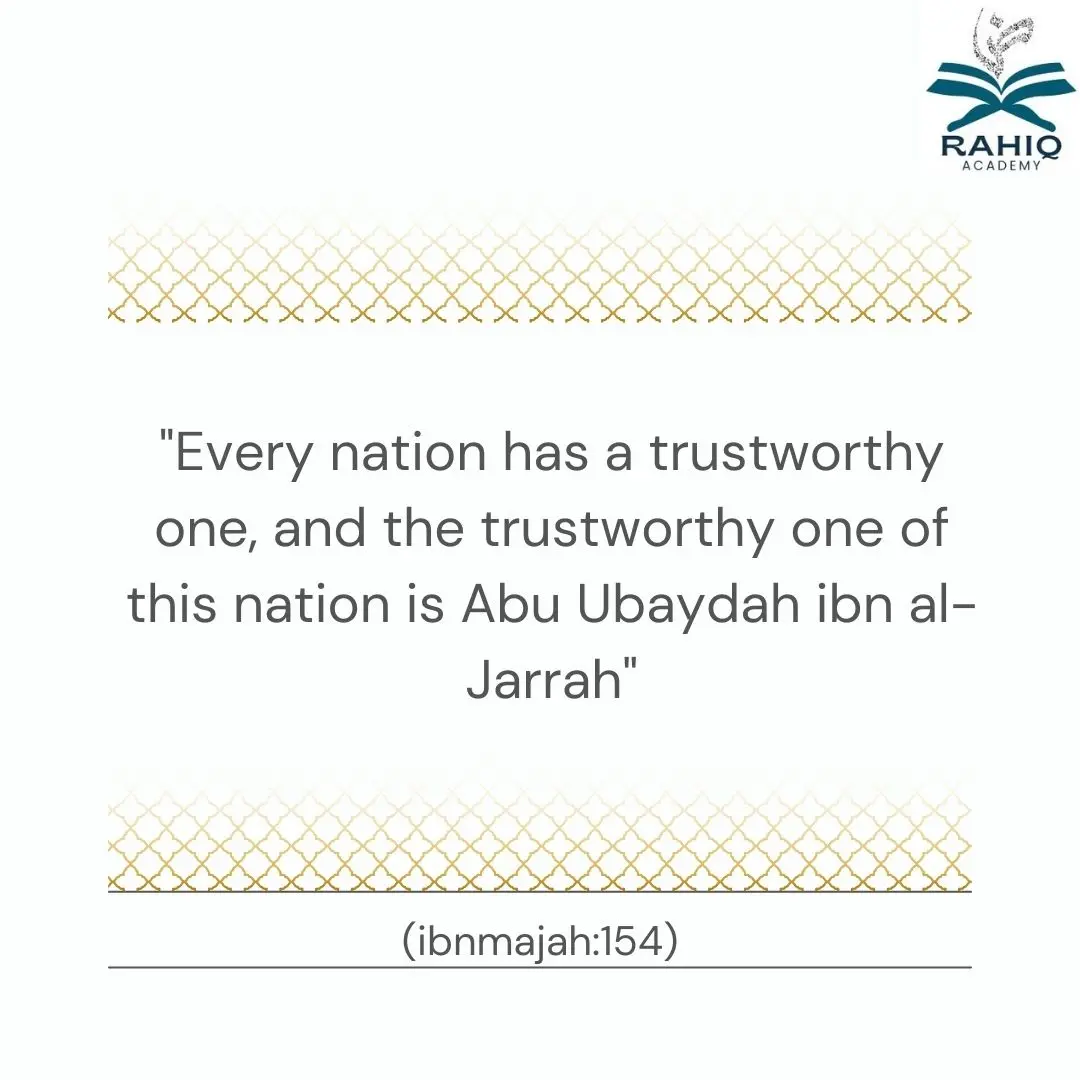Some people shape history through power, wealth, or conquest, but a few leave behind a legacy of faith, integrity, and sacrifice. Abu Ubaydah ibn al-Jarrah was one of these exceptional figures.
A man of unmatched honesty, courage, and humility, he was among the first ten people to accept Islam, a key military leader, and one of the ten companions whom the Prophet Muhammad personally promised Paradise.
Let’s explore his incredible abu ubaydah ibn al jarrah life
Abu Ubaydah Ibn Al Jarrah title

The Prophet ﷺ honored him with a title that defined his character:
إِنَّ لِكُلِّ أُمَّةٍ أَمِينًا، وَإِنَّ أَمِينَ هَذِهِ الأُمَّةِ أَبُو عُبَيْدَةَ بْنُ الْجَرَّاحِ
“Every nation has a trustworthy one, and the trustworthy one of this nation is Abu Ubaydah ibn al-Jarrah”
(ibnmajah:154)
But who was Abu Ubaydah? What made him so special that the Leader of Humanity called him the most trustworthy?
His Lineage and Background
Abu Ubaydah’s full name was Amir ibn Abdillāh ibn al-Jarrah. He was born into the Banu al-Harith ibn Fihr, a respected sub-clan of the powerful Quraysh tribe. His father, Abdullah ibn al-Jarrah, was a well-known leader, and his mother, Umaymah bint Ghanim, came from a noble family.
Despite being raised among the elite of Makkah, Abu Ubaydah was known for his modesty, fairness, and discipline.
His Early Faith and Struggles
When Abu Bakr al-Siddiq introduced him to Islam, he accepted it without hesitation, making him one of the earliest converts. However, being Muslim in Makkah meant persecution, loss of wealth, and social rejection.
But Abu Ubaydah stood firm, knowing that the reward of Allah was far greater.
وَالَّذِينَ هَاجَرُوا فِي اللَّهِ مِن بَعْدِ مَا ظُلِمُوا لَنُبَوِّئَنَّهُمْ فِي الدُّنْيَا حَسَنَةً ۖ وَلَأَجْرُ الْآخِرَةِ أَكْبَرُ ۚ لَوْ كَانُوا يَعْلَمُونَ
“And those who emigrated for the cause of Allah after being oppressed—We will surely settle them in this world in a good place, but the reward of the Hereafter is greater, if only they knew.”
(Surah An-Nahl, 16:41)
He later migrated to Abyssinia and then Madinah, leaving everything behind for his faith.
A Devoted Warrior and Leader
Abu Ubaydah didn’t just accept Islam—he defended it with his life. He fought in every major battle, including:
Battle of Badr (624 CE): A turning point for Islam
Battle of Uhud (625 CE): Where he defended the Prophet ﷺ with his own body
Battle of the Trench (627 CE): A brilliant military strategist
Conquest of Makkah (630 CE): He entered his home city humbly and justly
One of his most touching moments was at Uhud. The Prophet was severely injured, and metal links from his helmet were embedded in his blessed face. Abu Ubaydah rushed to him, carefully pulling the links out with his teeth, losing two of his own teeth in the process.
This wasn’t just bravery—it was pure love and devotion; he was a Devoted Warrior and Leader
Killing His Father
One of the most painful tests in his life came during the Battle of Badr. His father, Abdullah ibn al-Jarrah, was among the Quraysh warriors fighting against the Muslims.
His father repeatedly sought him out in battle, trying to kill him. Abu Ubaydah avoided confrontation, but when he was left with no choice, he struck him down.
Allah revealed a verse that perfectly described his sacrifice:
لَّا تَجِدُ قَوْمًا يُؤْمِنُونَ بِاللَّهِ وَالْيَوْمِ الْآخِرِ يُوَادُّونَ مَنْ حَادَّ اللَّهَ وَرَسُولَهُ وَلَوْ كَانُوا آبَاءَهُمْ
“You will not find a people who believe in Allah and the Last Day loving those who oppose Allah and His Messenger, even if they were their fathers.”
(Surah Al-Mujadila, 58:22)
For Abu Ubaydah, faith came first, even before family.
His Character
Abu Ubaydah was one of the greatest military leaders in Islamic history, but what truly set him apart was his humility.
Simplicity & Contentment: He lived with almost nothing
Trustworthiness: The Prophet ﷺ himself called him “Ameen al-Ummah.”
Justice & Fairness: A leader who ruled with honesty
Once, Umar ibn al-Khattab visited him in Syria and found him living in a small hut with only a sword, shield, and mat.
Umar wept and said:
“The world has changed us all, except you, O Abu Ubaydah.”
Siege of Jerusalem
In 636-637 CE, Abu Ubaydah led the Muslim army to Jerusalem during the Siege of Jerusalem. Instead of attacking, he negotiated peacefully, and the city’s Christian ruler, Sophronius, agreed to surrender only to Caliph Umar
Umar arrived dressed in simple clothes, and Jerusalem was taken without bloodshed.
This was a historic moment—proof that Islamic conquests were built on justice, not oppression.
His Death
In 639 CE, the plague of Amwas struck Syria. Abu Ubaydah was advised to leave, but he refused, choosing to stay and help his people. Eventually, he contracted the illness and passed away.
His final words were:
“Establish prayer, fast, give charity, perform Hajj, remain united, and do not be deceived by the world.”
Even in death, he remained Ameen al-Ummah—the most trustworthy.
Conclusion
abu ubaydah ibn al jarrah life is a testament to his unwavering commitment to Islam and his exemplary character
Abu Ubaydah ibn al-Jarrah was a true hero of Islam. His life, sacrifices, and leadership continue to inspire millions.
Want to learn more about the Sahaba?
Join Rahiq Academy today and deepen your knowledge of Islamic history, the Quran, and Arabic!
Enroll Now




